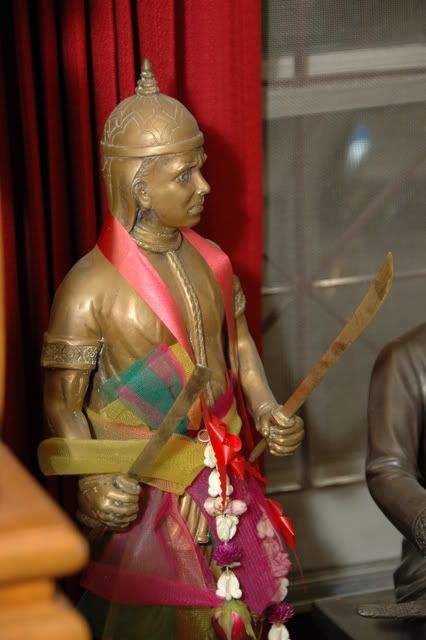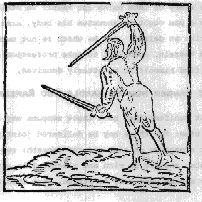
 |
|
|
#1 |
|
Member
Join Date: Aug 2007
Posts: 865
|
I was just thinking...in Thai sword fighting Krabi Krabong and also in thai history, eg famous thai swordsman, Phraya Pichai you see two sword handed fighting...but I have yet to seen any antique daarb pairs?!?...and wonder how really common it was?
 I can think of a few examples with other cultures where they have fought with two blades...European...Miyamoto Musashi but I haven't seen anything about Lao, Cambodian or Burmese fighting with a double pair of swords. Any thoughts or comments? |
|
|

|
|
|
#2 |
|
Member
Join Date: Oct 2008
Location: between work and sleep
Posts: 731
|
From the little I know, it seems dual-weilding wasn't all that common, but you can find it in Spanish and Filipino Espada y Daga. Also in India where a hero was said to have used a pata in each hand to carve a way through his enemies. Chinese seem to have a trend in dual swords with the fame of butterfly-blades and dual sabers.
I don't doubt that some Chinese martial concepts filtered down into SE Asia, just as Indian martial arts did... perhaps the Thai did have some dual sword methods... I know in the martial arts Krabi-krabong they DO train dual sticks... I don't doubt that those could be training sword movements. However I don't know if they carried their swords together or in separate sheaths, I'd guess the latter. EDIT: This link here may interest you... |
|
|

|
|
|
#3 |
|
Member
Join Date: Dec 2004
Posts: 987
|
Both Thai and Bama (Thaing/Banshay) martial arts have duel-wield forms. Here is a video with Banshay double-sword forms (minutes 2:57 and 4:29).
I have not found a matched pair of dha shay/daab, however I have seen matched pairs of dha hmyaung (daggers). My guess is that over the years the sword sets on the market have just gotten broken up, which is a pity. In Thai tradition pairs of daab are worn crossed on the back. I've wondered how a Bama would carry two dha shay, as the traditional way is by a loop over the shoulder, which would be a rather awkward way to carry a pair. |
|
|

|
|
|
#4 |
|
Member
Join Date: Dec 2004
Location: Oahu, Hawaii
Posts: 166
|
Nathaniel,
Just a few pictures to illustrate what Mark said. I have seen antique matched pairs at both the Armory in the Grand Palace and one especially nice set for sale at the River City Antique Mall (however they wanted the equivalent of $10,000). Just an assumption but I don't believe matched pairs were a common element in Darb Song Muah, you trained with what you had and most Armories that supplied weapons to the masses for battle were fairly equivalent in size and balance. Rather those matched sets were probably reserved for those of a special guard or for those of status. Dan |
|
|

|
|
|
#5 | |
|
Member
Join Date: Oct 2008
Location: between work and sleep
Posts: 731
|
Quote:
If you had one it was an heirloom or one from a local armory/depot... in which case you used what was given to you (by father or leader). I don't know how it was for the Thai, did all families have a darb? Somehow I doubt it... |
|
|
|

|
|
|
#6 |
|
Member
Join Date: Dec 2004
Posts: 1,247
|
Hi All,
One other thing about double blades is, to state the obvious, they are both blades, and they are both same length. Why does this matter? Shields tend to be cheaper than swords, and they cover more than a sword does. As such, they're better for defense than a second sword. If necessary, they can be torn to bits defending their wielder. That's why lots of people use shields, especially when they can only afford one good sword. Thing about paired long weapons of the same length is that they tend to get in each other's way. There are three solutions for this. One is to get really, really good, like Musashi. A second is to use shorter blades, which is what many paired weapons practices (in China, Europe, Japan, and SE Asia) do. Of course, this means you've surrendered the range advantage to your opponent. A third solution is to use a long/short blade combo, which was done in the Philippines, Europe, and China. Oh yeah, I think Musashi did it as well. Anyway, double weapons have some notable weaknesses, which is why double blades aren't common. The warriors who use them tend to be somewhat better than average. The weird thing actually is that the Dao isn't used with a shield very often. Wonder why? Best, F |
|
|

|
|
|
#7 |
|
Member
Join Date: Dec 2004
Posts: 987
|
Hey, Dan! Good to see you posting again.

|
|
|

|
|
|
#8 |
|
Member
Join Date: Dec 2004
Location: Oahu, Hawaii
Posts: 166
|
Good to be back. Not to high jack Nathaniel's thread but with being deployed moving to Hawaii and trying to finish my Masters .... I did however get my entire collection out of Japan and the mainland and get it all in one place finally. I'll have a few items up soon (no dha though)

|
|
|

|
|
|
#9 | |
|
Member
Join Date: Dec 2004
Location: Virginia
Posts: 520
|
Hi dan I hope all goes well great to see you again
Quote:
  Though the argument about double blades/sword and shield/sword and axe will go on long beyaond our lifespan and I will admit dual sword forms were probably not the norm nor used by conscripts who were farmers oneday and fighters the next. The pike and spear were probably the weeapon of conscripts. And I belief the dha was often used with a shield but the sields were of rattan and wood so mot as many survived as we collectors would wish As to the original question of how common daab song muu was I do not know that we will ever know. With chinese double blades the blades themselfs and thier furniture were crafted to fit two blades in one scabbard. With daab song muu they are in separate scabbards. Because of this the swords could be used as paired blades by one generation and then passed down to the next where they might be used as single blades possibly by two different people. I like to think that when I see two identical dha with definite age to them ( which does happen some) that they may have been used daab song muu but I could just as easily be letting romaticism tint my judgement As to there being difficulty using two weapons and the need for more training I agree completely with that and leave the words of DiGrassi about a case of rapiers There are also used now adays, aswell in the schools, as in the lists, two Swords or Rapiers, admitted, and approved both of Princes, and of the professors of this art, for honorable and knightly weapons, albeit they be not used in the wars. Wherefore I shall not vary from my purpose, if I reason also of these, as far as is agreeable to true art. To him that would handle these weapons, it is necessary that he can aswell manage the left hand as the right, which thing shalbe (if not necessary) yet most profitable in every other kind of weapon. But in these principally he is to resolve himself, that he can do no good, without that kind of nimbleness and dexterity. For seeing they are two weapons, and yet of one self same kind, they ought equally and indifferently to be handled, the one performing that which the other does, and every of them being apt aswell to strike as defend. And therefore a man ought to accustom his body, arms and hands aswell to strike as defend. And he which is not much practiced and exercised therein, ought not to make profession of this Art: for he shall find himself to be utterly deceived. |
|
|
|

|
|
|
#10 |
|
Member
Join Date: Aug 2007
Posts: 865
|
Great! Last time I checked on the thread there was only one reply! Thanks to everyone for contributing their thoughts, and knowledge! Good points about the spears...less metal, quicker to make and the same with shields. Swords of different length is a good point with Phraya Prichai....and similar double bladed traditions European, Phillipine, Korean, malay and Chinese.
Nice quote from DiGrassi, Michael. Thanks for sharing all. I hope people keep it going. |
|
|

|
 |
|
|